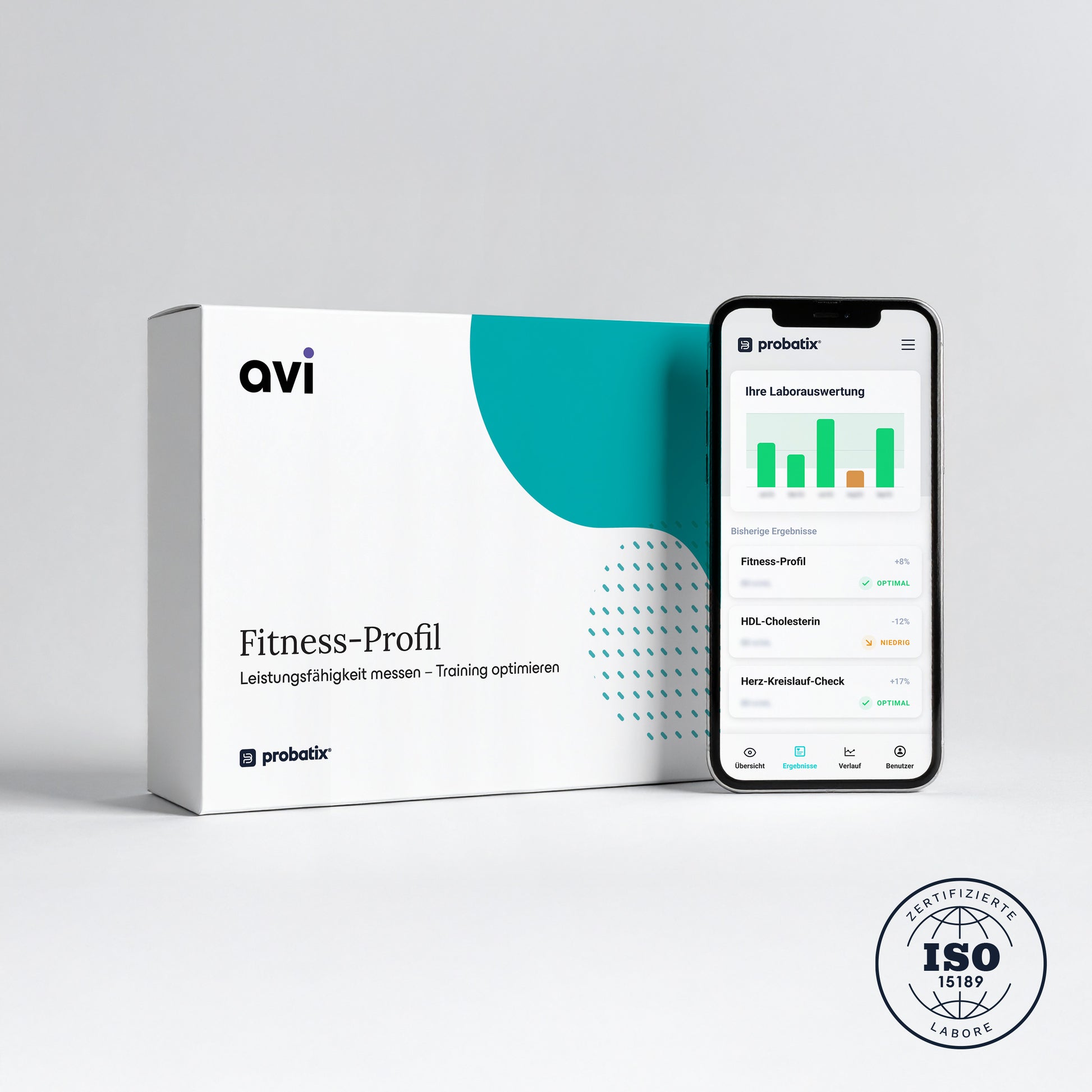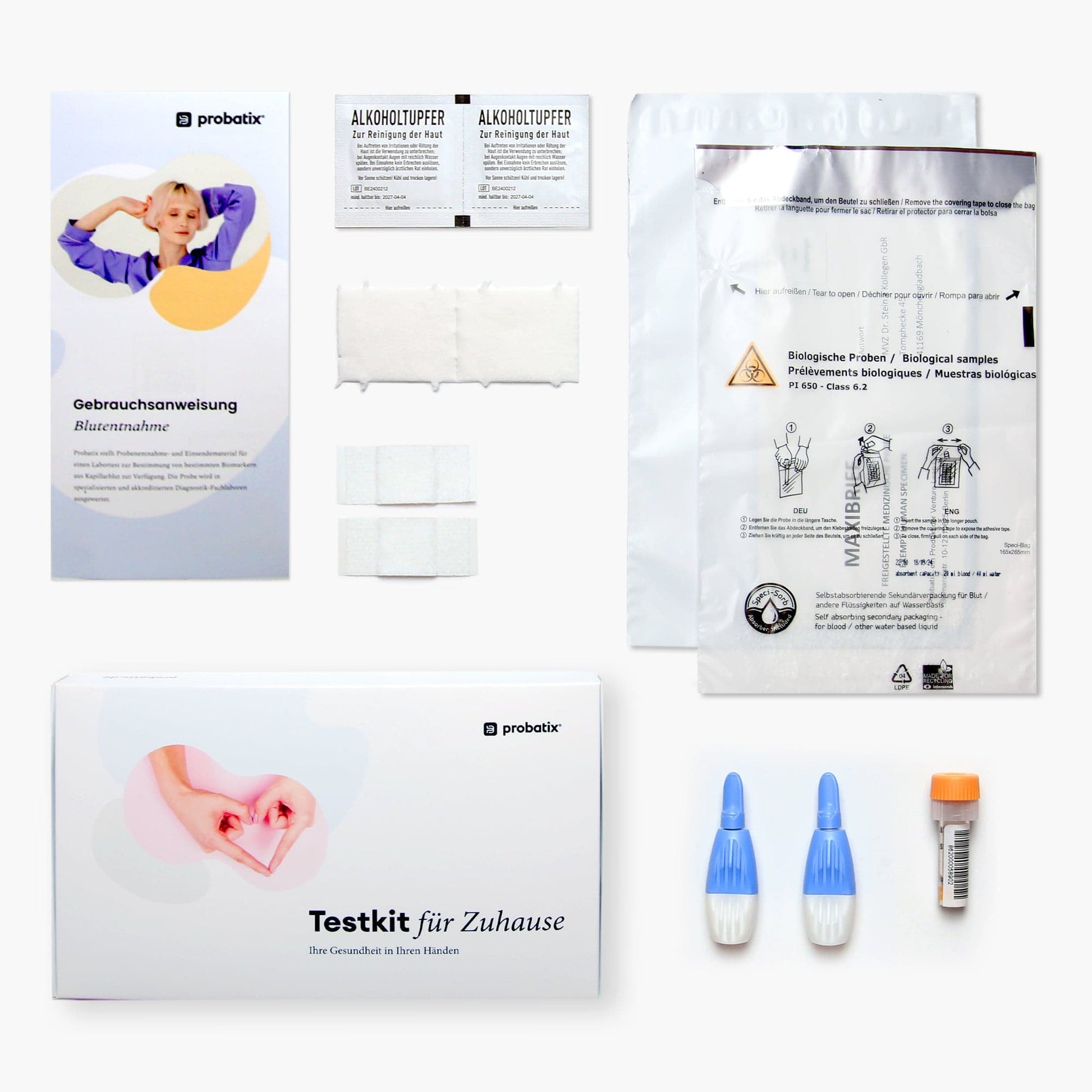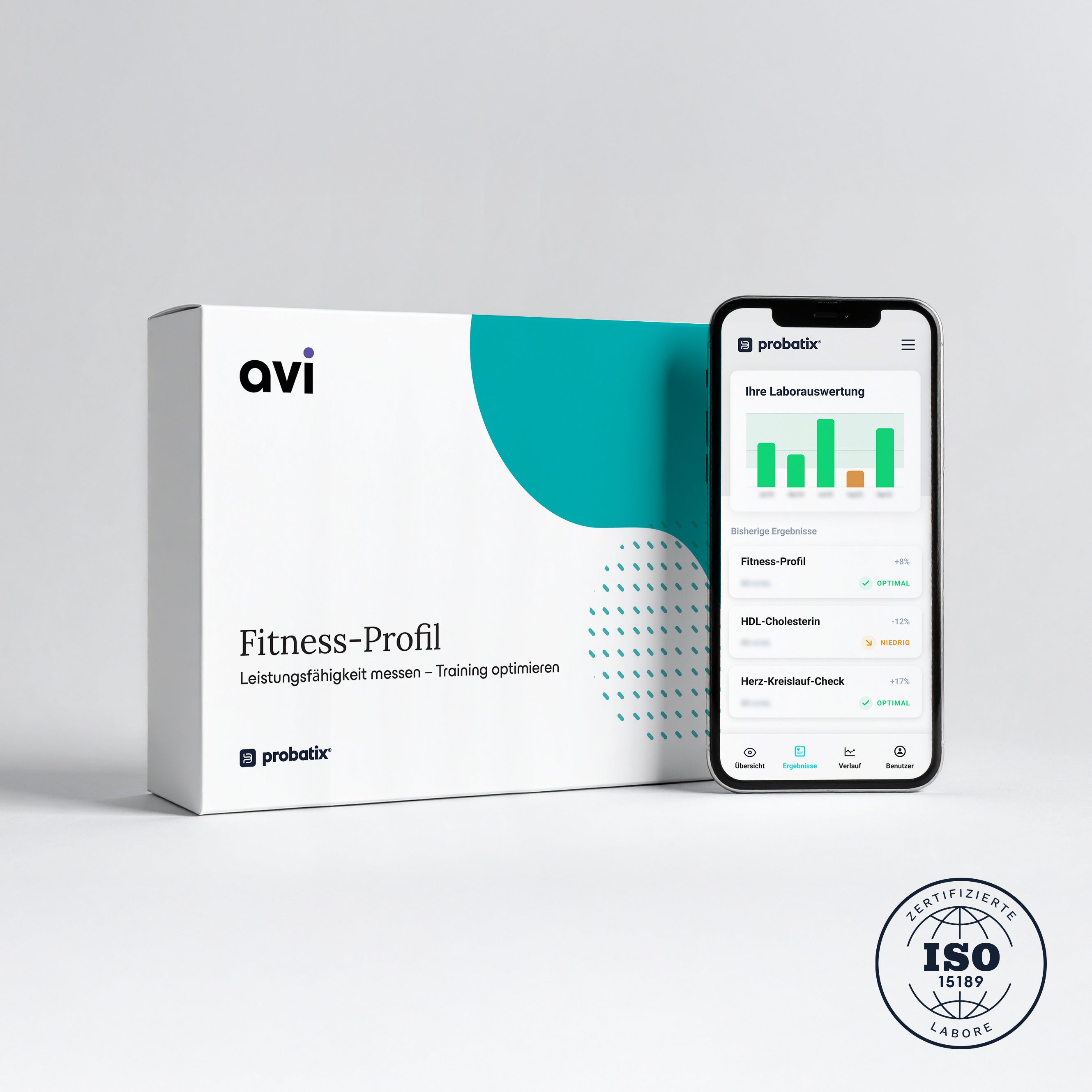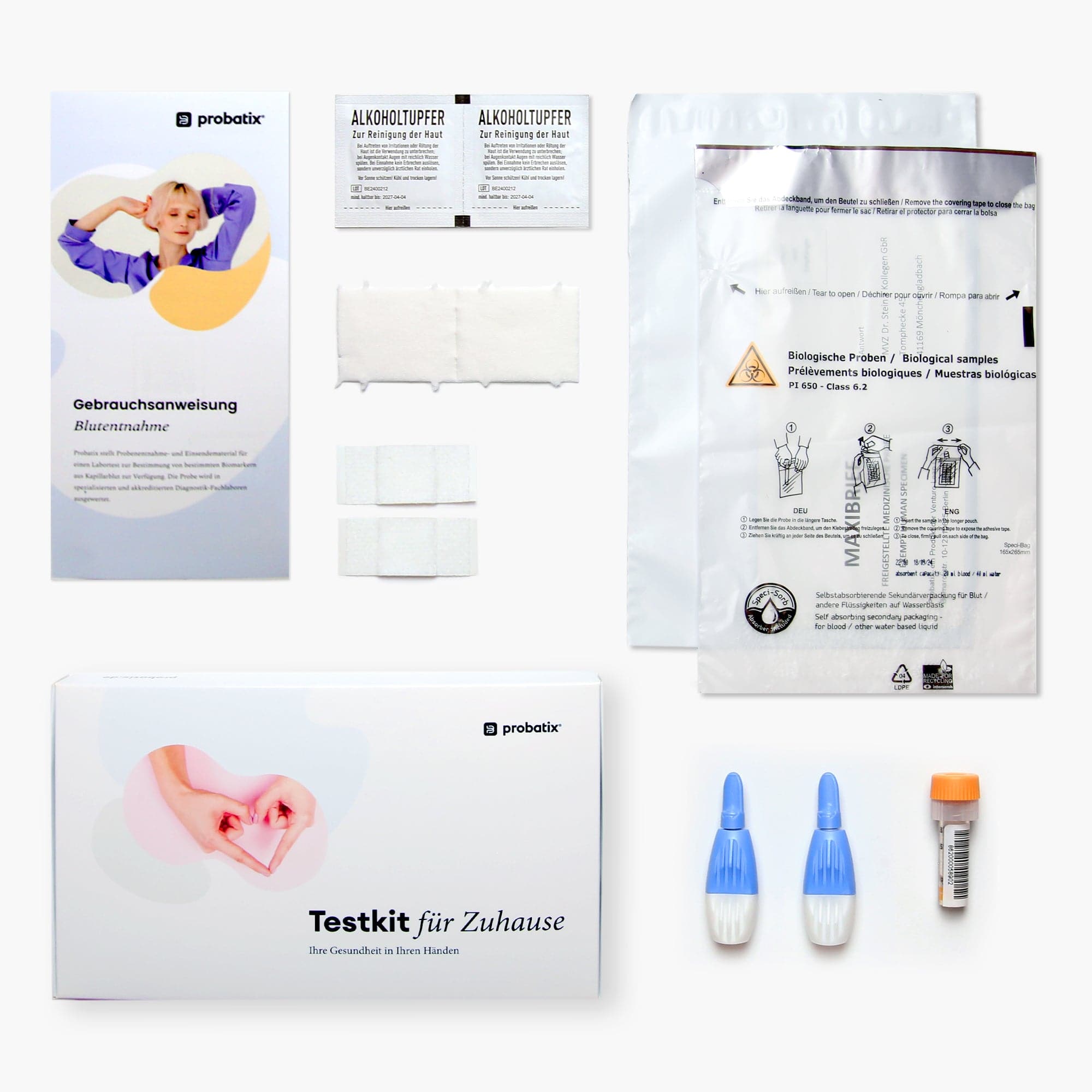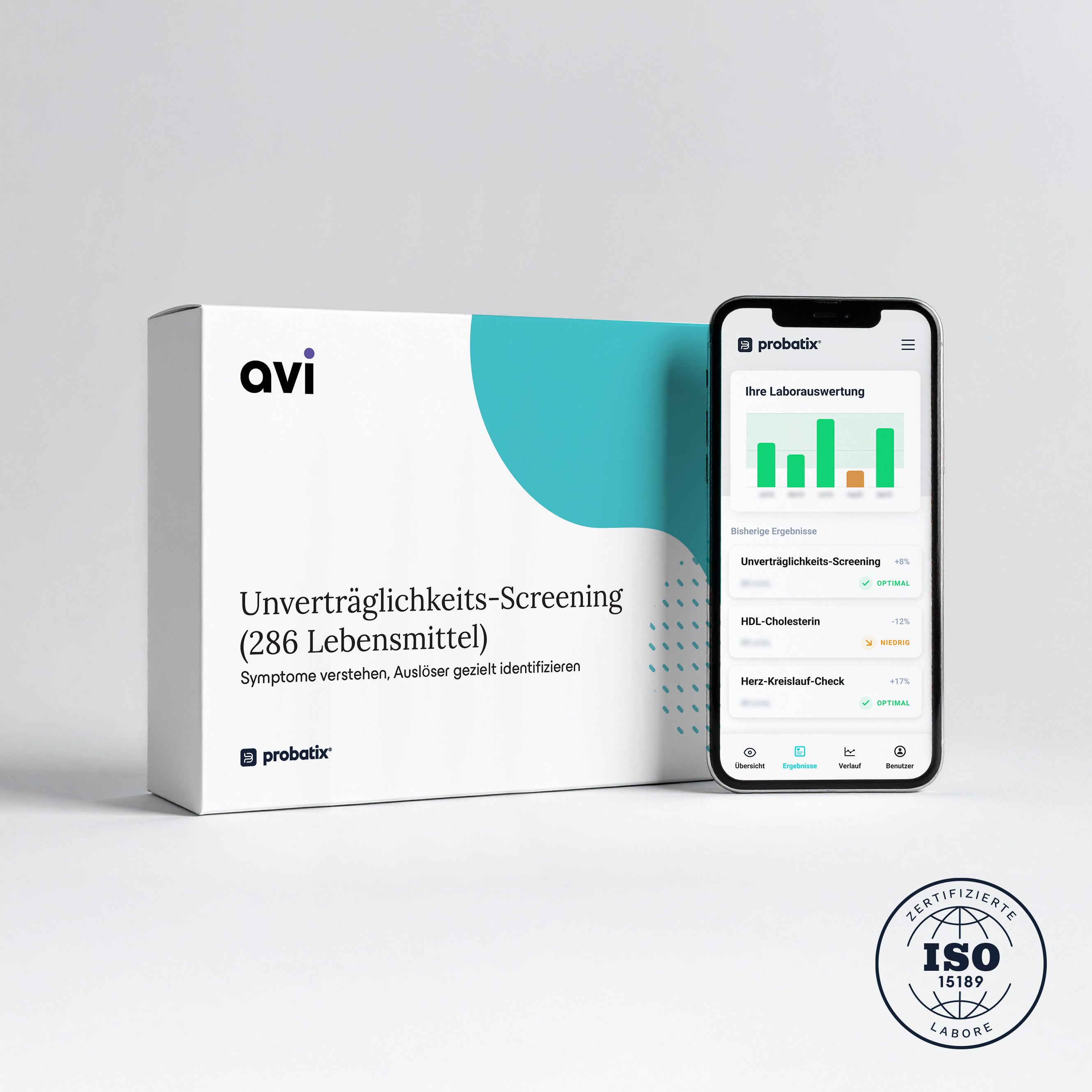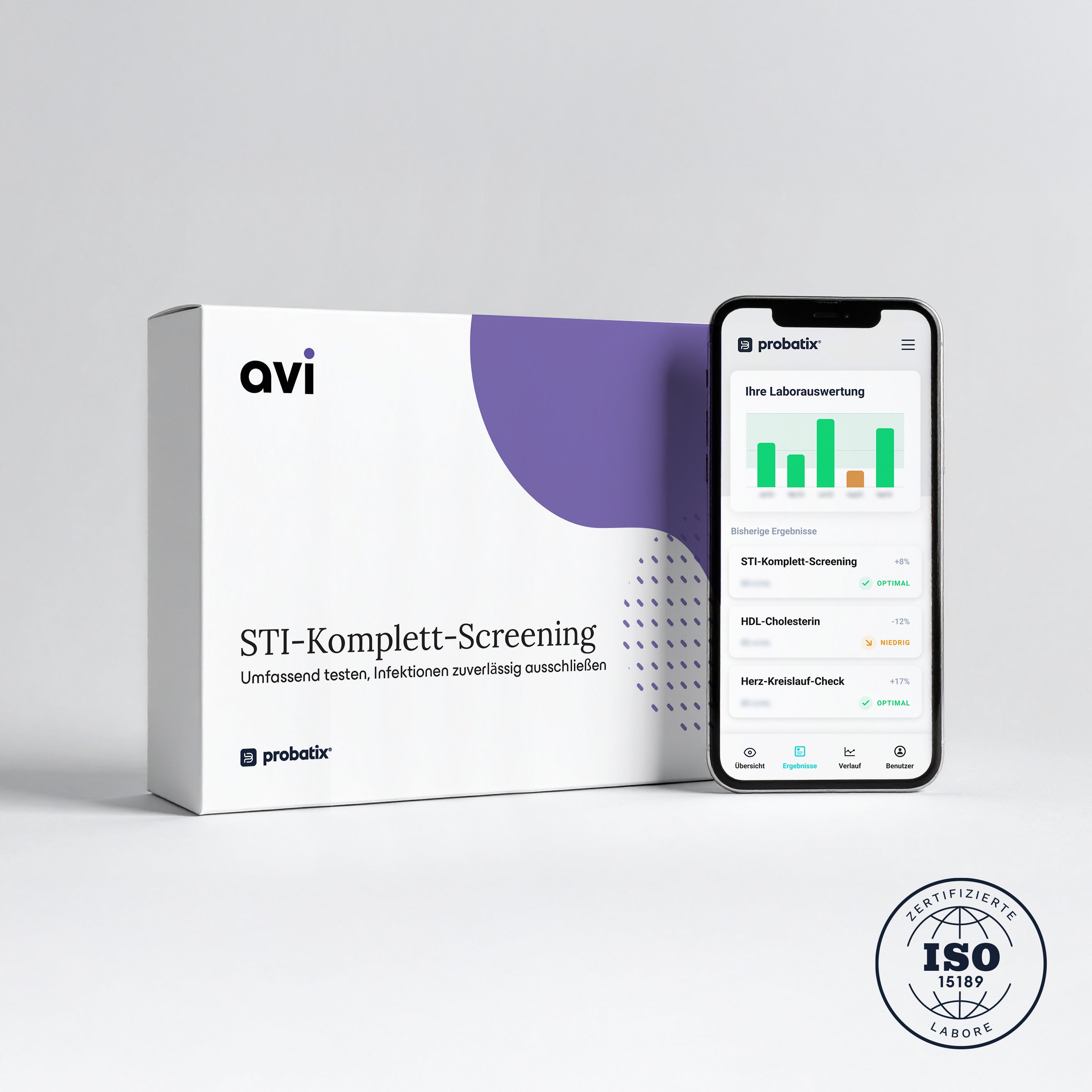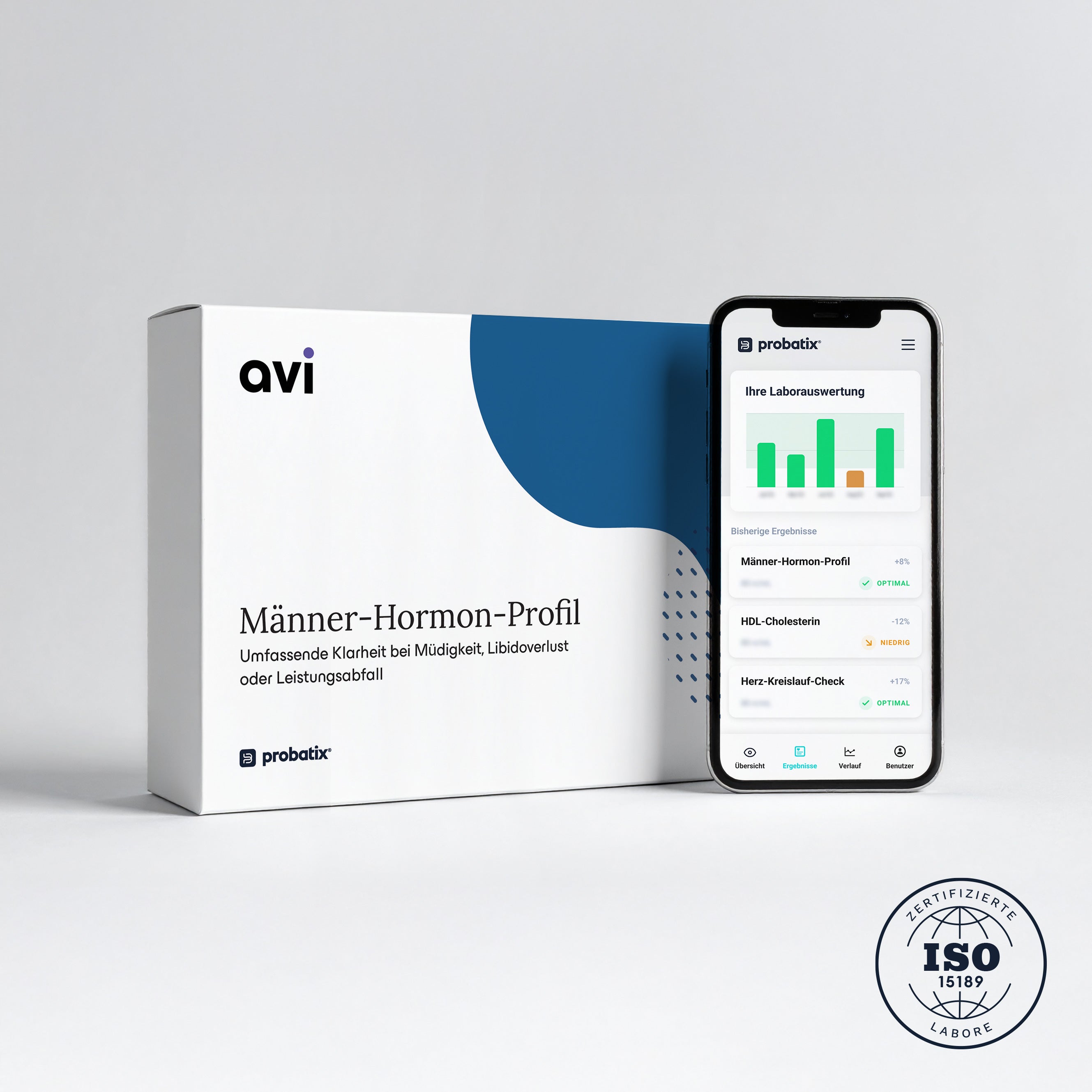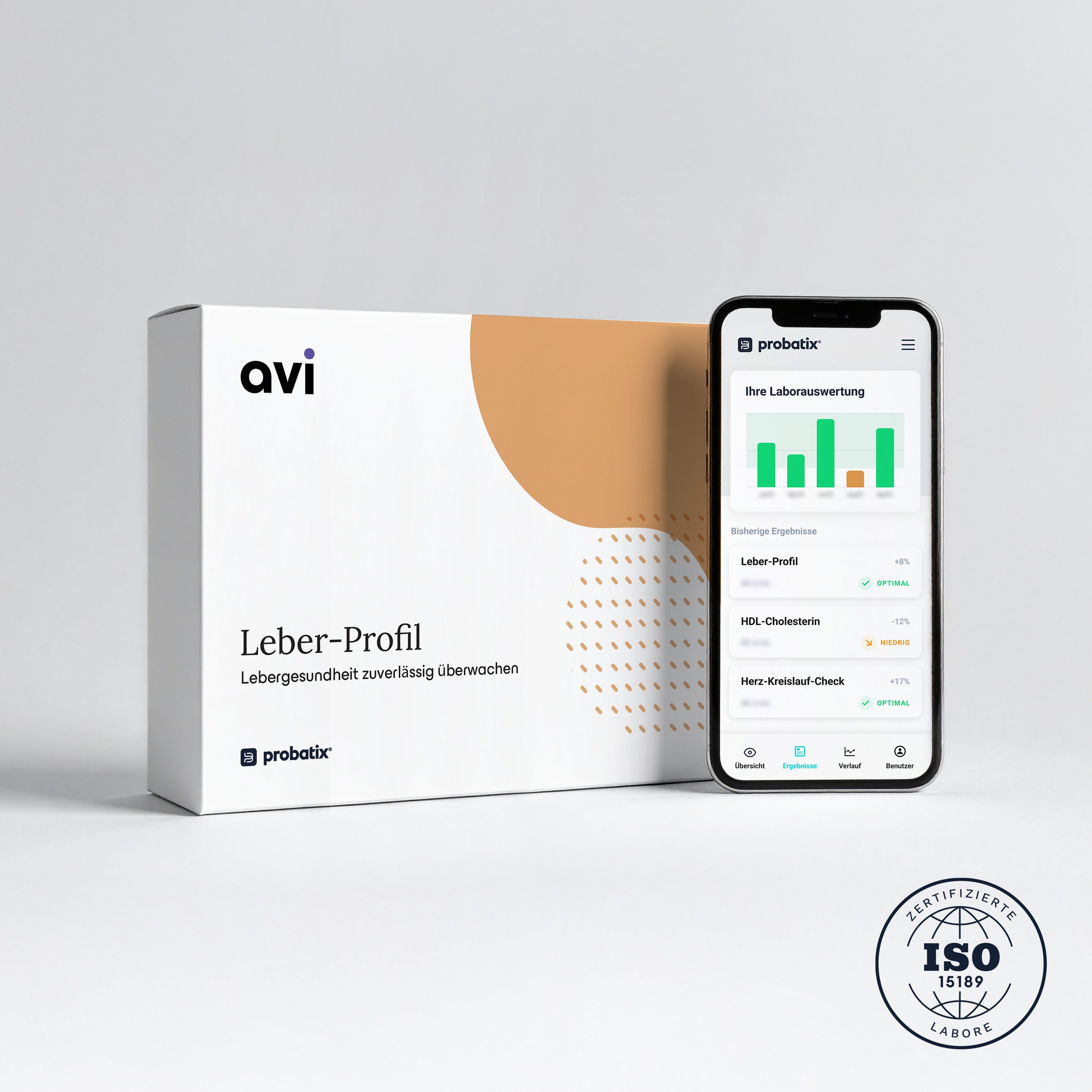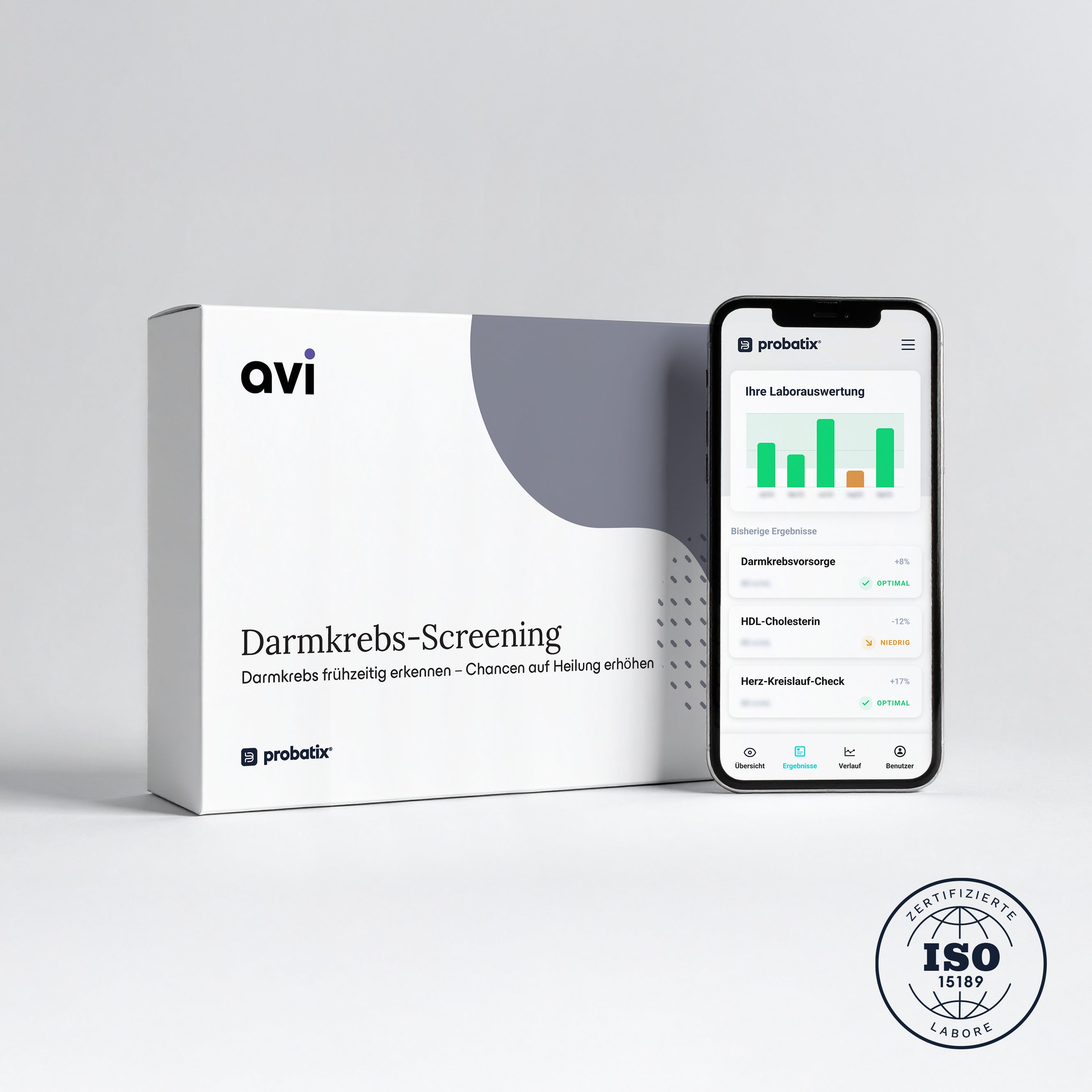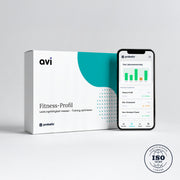Fitness Profile - avi
Fitness Profile - avi
Your body accomplishes a lot every day – with the Fitness Profile, you gain valuable insights into your muscle health, metabolism, and cardiovascular fitness.
- Comprehensive Analysis: Measures creatine kinase, creatinine, HDL and LDL cholesterol, triglycerides, HbA1c, vitamin B12, vitamin D, calcium, and uric acid – for a complete picture of your fitness.
- Early Detection Made Easy: Identifies nutrient deficiencies, metabolic disorders, or stress indicators that may limit your performance.
- Convenient & Reliable: Easy sampling from home with professional lab analysis and clear results in the dashboard.
For everyone who wants to know how resilient their body really is.
avi begleitet Sie – besprechen Sie anschließend Ihre Ergebnisse einfach per Video mit Ihrer Ärztin oder Ihrem Arzt.
➡️ Buchen Sie jetzt Ihren Termin bei aviIn stock
What values does this test measure?
What values does this test measure?
For more information on the values, please click here.
How does it work?
How does it work?
1. Take a sample with our test kit
2. Send the sample to the lab with the prepaid envelope
3. View results digitally after a few days
Why are the values reliable?
Why are the values reliable?
All tests offered by us are evaluated and validated in certified medical laboratories in Germany.
This is what the press says about our tests
Fitness Profile - avi: All details about the test
What benefits does this test offer me?
What benefits does this test offer me?
Whether endurance, strength, or regeneration – your performance depends on muscles, metabolism, nutrients, and cardiovascular health. Imbalances or overloads can cause fatigue, long recovery times, or performance losses.
With the Fitness Profile, you receive an analysis of key blood values that show how resilient your body really is.
The test measures, among others:
- Creatine Kinase & Creatinine: Marker for muscle metabolism and stress.
- Vitamin B12 & Vitamin D: Crucial for energy, nerve function, bones, and regeneration.
- HbA1c: Long-term blood sugar value – important for energy metabolism.
- HDL, LDL Cholesterol & Triglycerides: Levels of your cardiovascular fitness.
- Calcium & Uric Acid: Relevant for muscle contraction, bone health, and metabolic balance.
Why is this test important?
Only when muscles, metabolism, and nutrients are in balance can training and recovery function optimally. The Fitness Profile helps to identify deficiencies or overloads early and specifically enhance your performance.
Who is the test suitable for?
Especially suitable for fatigue, slow recovery, frequent muscle soreness, concentration problems, or noticeable blood sugar and cholesterol levels.
Stay fit and resilient – with the Fitness Profile.
What do the measured values mean?
What do the measured values mean?
Creatine kinase is an important marker for muscle and heart diseases. Its determination allows for the early detection of damage to these tissues and is therefore an indispensable tool in clinical diagnostics.
Creatinine
Creatinine is a breakdown product of muscle metabolism that is filtered out of the blood by the kidneys. The creatinine level provides information about kidney function, with elevated levels potentially indicating a kidney dysfunction.
Vitamin B12
Vitamin B12 is an essential vitamin required for the formation of red blood cells, the functioning of the nervous system, and the production of DNA. It is found almost exclusively in animal foods such as meat, fish, eggs, and dairy products.
A deficiency in Vitamin B12 can lead to anemia, fatigue, concentration problems, and nerve damage. Those at increased risk for a deficiency include primarily older people, vegetarians, vegans, or individuals with absorption disorders in the intestine.
25-OH-Vitamin-D3
25-OH vitamin D is the storage form of vitamin D that the body produces in the liver from vitamin D formed with sunlight or food. Vitamin D supports calcium absorption, ensures healthy bones and teeth, and plays an important role for muscles, nerves, and the immune system.
The 25-OH vitamin D test is the best method to check vitamin D status. Low levels can indicate too little sunlight, an unbalanced diet, or diseases and are associated with bone diseases such as osteoporosis or rickets. Excessive levels usually result from too high supplement doses and can strain the kidneys and liver.
HDL cholesterol
HDL cholesterol is often referred to as "good cholesterol" because it transports excess cholesterol from the vessels to the liver. There, it is broken down or recycled, reducing deposits in the arteries. Thus, HDL helps to keep the vessels healthy and free from calcifications.
High HDL levels are considered beneficial as they are associated with a lower risk of cardiovascular diseases. On the other hand, low levels increase the risk of arteriosclerosis and heart attack.
LDL cholesterol
LDL cholesterol is referred to as "bad cholesterol" because it transports cholesterol from the liver to the body's cells. Excess LDL can deposit in the vessel walls and form so-called plaques. These deposits narrow the vessels and increase the risk of cardiovascular diseases.
High LDL levels are an important risk factor for arteriosclerosis, heart attack, and stroke. Low levels, on the other hand, are considered beneficial for vascular health.
Triglycerides
Triglycerides are the main form of fats in the body and are primarily stored in fat cells. They are formed when excess energy from food is converted into fat. Some triglycerides circulate in the blood and serve as an energy source.
Elevated triglyceride levels can increase the risk of cardiovascular diseases, especially when LDL is high and HDL is low at the same time. Very high levels can also trigger inflammation of the pancreas.
Calcium
Calcium is an essential mineral primarily stored in bones and teeth. It ensures the stability of the skeleton and plays an important role in muscle function, blood clotting, and nerve signal transmission. A blood test measures the portion circulating in the blood.
Too low calcium levels can cause muscle cramps, tingling, or heart rhythm disturbances. Too high levels often indicate disorders of the parathyroid gland, certain tumors, or excessive intake of vitamin D.
Uric acid
Uric acid is a breakdown product of purines, which come from food or cells. An elevated level can not only lead to painful gout attacks but also indicate a metabolic imbalance that can strain the kidneys and joints in the long term.
Long-term blood sugar (HbA1c)
HbA1c is a long-term blood sugar value that indicates the average blood sugar level over the past two to three months. It forms when sugar attaches to the red blood pigment hemoglobin. Since red blood cells live for about three months, the HbA1c value provides a good overview of long-term blood sugar control.
A high HbA1c value suggests poorly controlled or previously undetected diabetes. Normal values indicate stable and good blood sugar control.
Why is this test important?
Why is this test important?
Athletic performance depends on many factors – from muscle function, metabolism, blood sugar regulation, and cardiovascular health. With the fitness profile, you monitor your physical endurance and receive valuable insights to specifically optimize training and nutrition.
When should I take this test?
When should I take this test?
- html
- During intensive training or high physical exertion.
- If you recover more slowly after exercise or frequently have muscle soreness.
- For regular monitoring of metabolism and blood sugar.
- In case of fatigue, lack of energy, or muscle cramps.
- If you want to optimize your nutrient supply and recovery.
The fitness profile helps you realistically assess your resilience, specifically improve your fitness, and recognize overloads or deficiencies in time.
What is included in the test kit?
What is included in the test kit?
Where can I find the instructions?
Where can I find the instructions?
Bei Fragen hilft Ihnen auch immer gerne unser wunderbarer Support weiter: support@probatix.de
FAQ - More Frequently Asked Questions about the Test
FAQ - More Frequently Asked Questions about the Test
What is examined in the fitness profile?
The fitness profile measures key biomarkers for muscles, cardiovascular system, and metabolism: creatine kinase (CK), creatinine, vitamin B12, vitamin D, HDL and LDL cholesterol, triglycerides, calcium, uric acid, and HbA1c (long-term blood sugar).
Who is this test suitable for?
The test is ideal for anyone who wants to keep an eye on their performance, recovery, and nutrient supply – especially athletes, active individuals, or people with high physical demands.
How does the sampling work?
The sampling is simple and painless via capillary blood from the fingertip. You will receive a test kit with clear instructions for easy home use.
How long does it take to receive my results?
After submitting the sample, you will typically receive your lab results digitally within 3–5 business days.
Why is creatine kinase (CK) measured?
Creatine kinase (CK) is an important marker for muscle metabolism and cellular stress. Elevated levels can indicate intense training, muscle fatigue, or overexertion.
What role do Vitamin B12 and Vitamin D play?
Vitamin B12 is essential for energy production, cell division, and nerve function. Vitamin D supports bone metabolism, muscle function, and the immune system.
What does the lipid profile say about my fitness?
A balanced lipid profile (HDL, LDL cholesterol, and triglycerides) is crucial for healthy cardiovascular function and directly affects performance and endurance.
What happens if my values are outside the reference range?
If abnormalities are detected, you should discuss the results with a doctor. This way, further examinations can be arranged, and targeted measures can be taken.
Das sagen unsere Kunden
Your benefits for your health
Test with minimal effort
Understanding your own health
Recognize changes early
